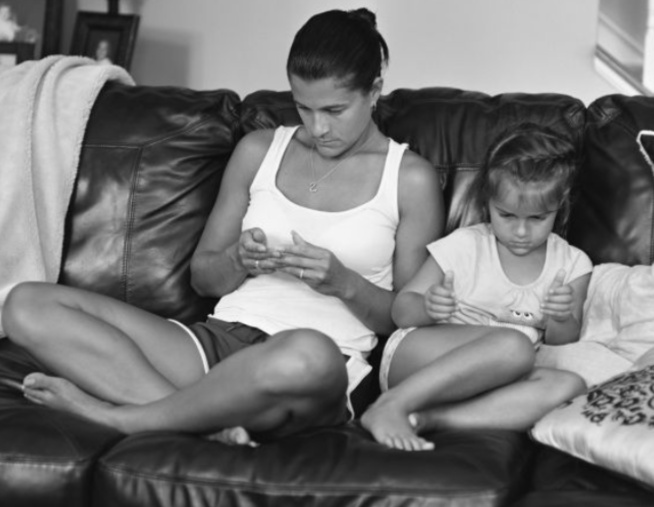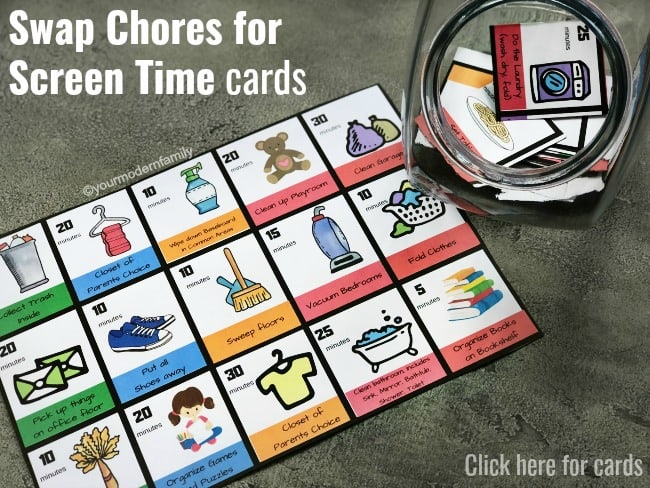This post may contain affiliate links. Please read our disclosure policy.
Why are our children are so many children acting more entitled than generations before? Why do so many children seem more lonely, even though they can get in touch with their friends & family anytime they want… with the touch of a fingertip? It’s really what all parents need to know & what studies are proving it to be true.
Study after study proves what we have guessed…
It’s the scary truth that our children face. As a teacher and play therapist, I’ve heard from so many parents that their kids are acting entitled, lonely & sad.
Last week, a friend and fellow teacher printed out a section of an article talking about the reasons that kids are bored & easily frustrated, making them less patient– an article that was written by Victoria Prooday: Occupational Therapist, speaker, blogger & founder a multidisciplinary clinic for children with challenges on her blog, YourOT.
Victoria writes:
“What good are we doing them by giving them what they WANT when we know that it is not GOOD for them? Without proper nutrition and a good night’s sleep, our kids come to school irritable, anxious, and inattentive. In addition, we send them the wrong message. They learn they can do what they want and not do what they don’t want. The concept of “need to do” is absent. Unfortunately, in order to achieve our goals in our lives, we have to do what’s necessary, which may not always be what we want to do.”
– Victoria Prooday.
I talked to Victoria Prooday on the phone & she is amazing, to say the least! She had some amazing viewpoints & advice on this subject that you should check out. Her suggestions helped to shape today’s post. After I hung up, my friend and I started talking about the “me generation” we both agreed that screen-time and the thought of “mine, mine, mine” have a lot to do with the change in children.

Next, I dug into the subject a little more. I spent time researching, and I came across this article on PsychologyToday.com. It is an article about a little boy using his video game, during a family gathering:
“After being on his handheld electronic game for an hour, “A perfect storm is brewing. His brain and psyche become overstimulated and excited — on fire! His nervous system shifts into high gear and settles there while he attempts to master different situations, strategizing, surviving, and defending his turf.
His heart rate increases and his blood pressure rises — he’s ready to do battle. The screen virtually locks his eyes into position and sends signal after signal: “It’s bright daylight out, nowhere near time for bed!” – he’s ready to fight or escape!” ~ PsychologyToday.com
The story goes on to say that his little sister came over and put her hand on the game. He hadn’t noticed her walking towards him because he was so involved in the game. Due to his elevated feelings, he screams at her and runs to his room.
His mother follows him and tells him to get off of the electronics, and get ready for bed, which makes him feel frustrated, as well as physically and emotionally angry. He feels like he was ripped out of his “fun” virtual world and put into a “boring” real world. Kids can’t adjust so quickly, and it brings about unwanted feelings and actions.
It’s happening all the time, but we can help. How?
1. Let them be bored.
“Families [overly] centered on children create anxious, exhausted parents and demanding, entitled children. We parents today are too quick to sacrifice our lives for our kids. Most of us have created child-centered families, where our children hold priority over our time, energy and attention.” ~ American Journal of Preventive Medicine
Instead of letting them find their own fun, we find ways to help them ‘have fun.” They are forgetting how to keep themselves entertained, or to just let their minds be still to daydream.
“Don’t always stress about providing something for your kids to do. Boredom won’t kill them ― it will actually make them stronger.” ~ American Journal of Preventive Medicine
What if instead of trying to keep our kids busy and keep them from feeling bored, we just LET them be bored. What if we said, “Oh- you’re so lucky to be bored.” (It’s the truth, right? Don’t we wish we had time to be bored?). Don’t offer an electronic device to keep them busy, don’t offer to take them somewhere.
Just let them be bored and watch:
-Watch your child’s mind becomes quiet and watch his interests take over.
-Watch as it leads him to create his own fun.
-Watch as his need or instant gratification fades away.
Boredom is the path to learning about one’s self.

2. Let them be resourceful.
“Children and young adults are pretty resilient and resourceful when we let them be. Unfortunately, most of the time, parents are afraid to loosen the reins and let them be. It’s time for that to change.” – Jennifer Harstein, USA news.
It’s not easy to watch our kids fail. It’s not easy to watch them be sad, frustrated or upset. Just try to remember that it is easier to let them fail with these little things now, like not doing their work and losing recess time at school, than to watch them fail when they are adults and forget to pay their mortgage and lose their house.
“The problem with bribing children to do something is that they could possibly grow up believing that they always deserve some additional reward for simply doing what they are expected to do. I don’t want my kids asking me what’s in it for them every time I need them to do a simple task like brushing their teeth or putting on their shoes. I don’t want them to think bargaining with me over everyday tasks is an option.” ~ Brittany (my good friend) writes on her blog, A Healthy Slice of Life
3. Let them PLAY in real life.
My brother told me that teens in his high school (he is the principal), will hang out on Google Hangouts instead of each other’s houses. It made me want to start looking into things.
“We know from lots and lots of research that spending time with other people in person is one of the best predictors of psychological well-being and one of the best protections against having mental health issues.” – Audie Cornish

Time on social media “may elicit feelings of envy and the distorted belief that others lead happier and more successful lives,” a study published in the American Journal of Preventive Medicine says.
Today’s children and teenagers are spending less time with their friends in person. They aren’t playing games together. Instead, they are getting together “online.” They are losing the opportunity to learn valuable social skills from real human interactions.
These social skills are so valuable, in fact, that study after study proves they are the key to a prosperous future. Excellent social skills, combined with intelligence, are now considered to be the key to having a high-paying job.
“Leadership requires you to be socially adept. In fact, your social skills may be just as important as your intelligence when it comes to achieving success,” according to new research published in in the Review of Economics and Statistics. ~ American Journal of Preventive Medicine

4. Let them lose
I am ALL FOR REWARDING children, but not constantly. Not only does it lose it’s ‘shine,’ but it sets up our children to look for external rewards instead of internal rewards. The Trophy Dilemma, as my husband calls it, isn’t going to motivate them for long.
We need our kids to learn to do things without complaining and without getting a reward. Their boss/landlord/spouse isn’t going to be so accommodating, so it is best that they learn now. They won’t get a bonus or time-off because they did their work on time. They won’t get a month off of their mortgage payment because they paid it on time. Yes, it’s hard to teach them these lessons.

5. Give them Ten Minutes a Day.
Did you know that the average parent spends less than 20 minutes a day playing with their kids? I learned that during my play therapy training.
Try to reconnect daily with your kids. Have one-on-one time with each child for ten minutes a day: No electronics, NO iPads or tablet, NO television. Let your child be your guide (They pick the activity). This time alone is going to eliminate any guilt that you feel (because we all feel guilt), and it is going to allow you to connect you with your child.
Use the 10-minute ‘bedtime’ opportunity to talk to them. This post might give you some insight into what I mean when I say “10 minute bedtime opportunity”
Get back to what we did before phones (back to what our parents did when we were young), spending time playing games with our kids.
You can use something simple like these one-on-one time cards (print them, cut them out & grab one a day)
6. Give Responsibilities
Chores are about so much more than just cleaning. Responsibilities increase their self-worth. It teaches them how to work. It teaches them to take care of things. It teaches them how to be part of something bigger than themselves.
“To develop a high self-esteem a person needs a purpose. A key component to high self-esteem relies on how you view yourself regarding contribution. In other words, in the child development process, chores are a big role in a kid’s self-esteem.” ~Impact Parenting.com
I love our chore cards for this… here’s how I use them.
7. Bedtime
Have a set bedtimes
“A loss of one hour of sleep is equivalent to [the loss of] two years of cognitive maturation and development,” Time.com
Remember that the time that they go to bed matters. There are studies done that prove that children with irregular bedtimes behave worse than children with a regular bedtime.
8. Set Electronic Boundaries
We have a simple rule: No electronics UNLESS it is a show that we are all watching together on the TV. This means that they are not allowed to use laptops, (unless it’s school-related), tablet, iPods, phones, etc… If we finish getting ready for school quickly in the morning, we might watch a show on TV together.
If My husband and I are watching Jeopardy or Planet Earth, they are welcome to join in anytime. (Most kids have a LOT of tech time at school – they don’t need it at home.)
Exceptions: Doctor’s offices, all day sporting events, Car-line (school pickup can sometimes be 45 minutes. Our youngest child sits with me while we wait to pick up her siblings. She is allowed to have her Leap Pad in the car line to watch learning videos or play an educational game.)
This is where my chores for screentime cards come into play.
You can check out what I want all parents to know before giving their child a phone or device.
9. Be there for them.
Let them know that you are there for them. “If you are ever feeling sad or left out about something and it becomes too big for you to handle easily, come to me.” I remind our kids that I am always here for them, to talk through problems, just listen, pray for them, give them advice… or not. “I’m here… for you… all the time.” Remind them often.
10. Put down YOUR phone.
Make a rule with yourself that you will limit YOUR online distractions when your kids are home. Set a time that you can put electronics away (for our family – it’s 3:30, when they get home from school until 8:00, when they go to bed).
“Nearly one-third of children feel unimportant when their parents use their cell phones during meal times, conversations, TV watching and playing outside, according to a recent study. A June study by AVG Technologies surveyed more than 6,000 children, ages 8 to 13, from Brazil, Australia, Canada, France, The United Kingdom, Germany, The Czech Republic, and the United States.
The survey discovered that 32 percent of children felt unimportant when their moms and dads were distracted by their phones. The kids said they had to compete with technology for their parents’ attention, and 28 percent of mothers and fathers agreed with this observation.” American Journal of Preventive Medicine
Did you know that most kids think their parents spend too much time on their phones? Did you know that most kids wish their parents would get off of their devices more often? I wrote a whole post about parents being on their phones too much (after much research)
11. Teach by example
If you want your child to change, you must first make a change. Show your children where your priorities lie. Family, your spouse, etc… act the way that you want your child to act, and they will quickly follow your lead. Let your child see you reading a book, washing dishes, making dinner, having conversations where you sit and look the person in the eye. Demonstrate kindness, consistency, hard-work.

We only have 18 years to instill the qualities to last them a lifetime. Every moment matters, and you are the keys to their future.
If you would like to join me for a free One-on-One Time Challenge, I’ll send you these FREE Activities printable Calendar & e-mails to encourage you along the way:
TOOLS I LOVE:
Related Posts You’ll Like:
Instead of Giving Toys…The Scary Truth about What’s hurting our kids
Mommy? Will you lay with me?





















I was very interested in your chore chart ideas. We don’t do screen time during the week so how would it work? I don’t personally like the idea of them earning screen time for chores. Do you have other ideas?
Hi Jess, thanks so much for reaching out. That is great that you implement limited screen time during the week! 🙂 Please check out this post for more ideas for making chores fun: https://www.yourmodernfamily.com/board-chores/
I’m big on “set-times” for screen time. So in the summer, I might say, “You can have an hour when you wake up, but screens turn off at 10:00, and then you can have an hour in the evening while I’m getting dinner ready.” or something like that 🙂
I usually tell them that if we want to watch a show as a family, in the living room, that’s allowed & it doesn’t count towards screentime b/c I’m always up for family time, even it is just lounging together to watch a movie. (Although we generally only do this in the mornings or evenings if we are watching a movie or documentary or something.)